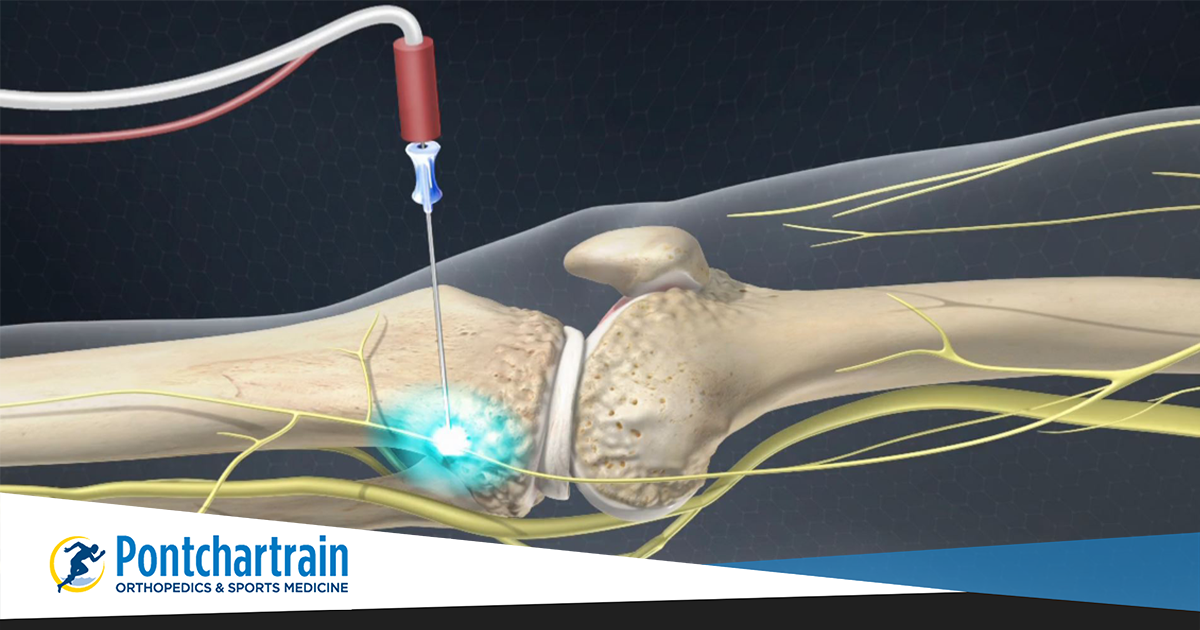RFA for Chronic Knee Pain

For many people, chronic knee pain from conditions such as osteoarthritis has become a part of life. When surgical procedures seem to be the only solution, reluctant patients may live with the debilitating pain. But the good news is that there’s another option that has shown great promise in providing relief - RFA for chronic knee pain.
How does RFA for chronic knee pain work?
Radiofrequency ablation (RFA) uses radio waves to create a heat lesion around the genicular nerves. The genicular nerves are responsible for carrying pain signals from the knee to the brain. Usually performed under local anesthesia, a needle is guided to the genicular nerves using real-time X-ray technology. Once it has been established that the correct nerve is targeted, heat is applied to create a lesion that blocks pain signals.
How effective is RFA?
RFA is a tried and true treatment for spinal pain, but its effectiveness on knee pain has been tested for the past decade with promising results. Clinical trials have proven it to be effective in providing 3-12 months of relief for some patients.
"RFA is a tried and true treatment for spinal pain, but its effectiveness on knee pain has been tested for the past decade with promising results."
- Michael Zeringue, MD, MPH
Who is a good candidate for RFA?
If other, less invasive treatments for knee pain have failed, you may be a good candidate for RFA. If traditional therapies such as physical therapy, weight loss, pain medications or steroid injections have not eased the pain, then RFA may be an alternative to surgery for patients who are unfit for a knee replacement or want to avoid the procedure.
RFA for chronic knee pain may be used as part of a complete treatment plan as it can provide enough pain relief to make physical therapy and exercises possible.
Patients who have had knee replacement surgery and still experience problems may also benefit. Some pain conditions that RFA can treat include:
What can I expect after RFA for chronic knee pain?
RFA for chronic knee pain generally takes about 30 to 90 minutes to complete, and most patients will return home the same day. Rigorous activity should be avoided for at least 24 hours after the procedure, and you may experience soreness in the area for a few days afterward.
The procedure can provide anywhere from three months to two years of relief, depending on the patient. While the effects will eventually wear off as the nerves recover from the procedure, RFA can be repeated as necessary.
"The procedure can provide anywhere from three months to two years of relief, depending on the patient. While the effects will eventually wear off as the nerves recover from the procedure, RFA can be repeated as necessary."
- Michael Zeringue, MD, MPH
How do I know if RFA is right for me?
An evaluation by one of our board-certified physicians can help determine if RFA for chronic knee pain is right for you. We can provide an accurate diagnosis and a treatment plan to help get you back on your feet. Contact us today to find out what treatment options are right for you. We can serve you in our conveniently located Boutte, LA clinic and our Metairie, LA clinic.
About the Doctor
 Michael Zeringue, MD, MPH is a triple board certified physician in Pain Management, Sports Medicine and Family Medicine and specializes in interventional spine and ultrasound guided injections. Dr. Zeringue earned his medical degree from Tulane University in New Orleans and completed his internship and residency in Family Medicine at John Peter Smith Hospital in Fort Worth, Texas. Following residency Dr. Zeringue finished two separate fellowships in Sports Medicine and Pain Management. He is a life long resident of the New Orleans area and served for several years as team physician for Brother Martin High School in New Orleans.
Michael Zeringue, MD, MPH is a triple board certified physician in Pain Management, Sports Medicine and Family Medicine and specializes in interventional spine and ultrasound guided injections. Dr. Zeringue earned his medical degree from Tulane University in New Orleans and completed his internship and residency in Family Medicine at John Peter Smith Hospital in Fort Worth, Texas. Following residency Dr. Zeringue finished two separate fellowships in Sports Medicine and Pain Management. He is a life long resident of the New Orleans area and served for several years as team physician for Brother Martin High School in New Orleans.
This website is not designed to and does not provide medical advice, medical diagnosis, professional opinion, treatment or services to you or any other person. Through this website and links to other websites, Pontchartrain Orthopedics & Sports Medicine provides general information for educational purposes only. The information provided in this website, or through links to other sites, is not a substitute for medical care. You should not use this information in place of a visit, call, consultation or the advice of your healthcare provider. Pontchartrain Orthopedics & Sports Medicine is not liable or responsible for any advice, course of treatment, diagnosis or any other information, services or product you obtain through this site.
